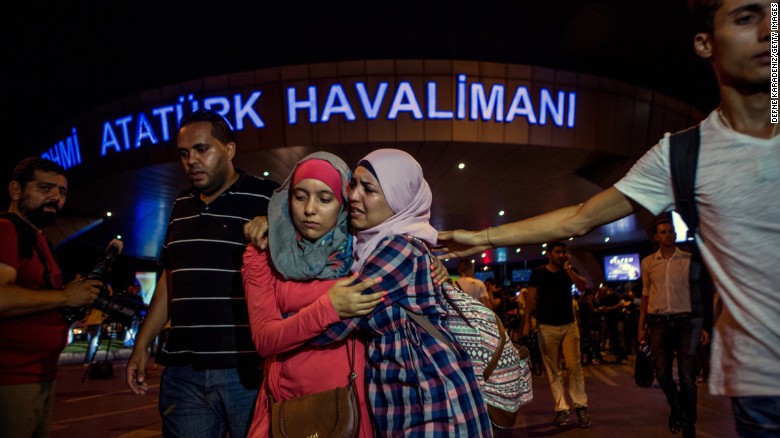
At an Ohio campaign stop on Monday, Donald Trump delivered what was billed as his big policy speech on counterterrorism, in which he was supposed to explain his plans to defeat ISIS.
So what were Trump’s ideas?
After laying out a long laundry list of well-known terrorist outrages by ISIS, Trump said, “We cannot let this evil continue.” If elected president, he would, he said, do things very differently than the Obama administration.
However, the Obama administration has long been pursuing many of the policy ideas Trump laid out.
— Partnering with Jordan and Egypt? Check
— Working with NATO? Check
— Cutting off ISIS funding? Check
— Cyber warfare against ISIS? Check
— Decimating al Qaeda? Check
Trump also said, “The era of nation building will be brought to a very swift and decisive end.” This is a straw man, because no one is calling for nation building in the American body politic, including Hillary Clinton, who in her own campaign appearance in Scranton, Pennsylvania, specifically said that American ground troops were “off the table” in Syria.
Trump also called for an international conference to stop radical Islam and a domestic commission on the same subject. Yet holding future conferences and setting up future commissions are not policy ideas.
So what exactly were Trump’s new policy ideas?
First, he said he would work with Russia to defeat ISIS. Trump has long been a fan of Vladimir Putin, but seems to be unaware that Russia’s goal in Syria is simply the maintenance of its longtime ally President Bashar al-Assad in power. Indeed, Moscow has hitherto shown little appetite to focus on ISIS.
Second, Trump called for a new kind of ideological test on immigrants from areas where terrorism is a problem. This seems unworkable. For example, would anyone sitting for these tests volunteer that they had secret proclivities for jihadist terrorism?
Also, Trump didn’t specify what countries would be affected by this new test. But France has a serious domestic terrorism problem — would French citizens be subjected to this kind of test? Or is he concerned about Syrian refugees, which the United States has taken only 10,000 of the millions who have fled the civil war in their country (and only 2% of whom are single, military-age males, according to the U.S. State Department).
In short, Trump didn’t say who would be targeted for these ideological tests, saying only that he would consult the State Department about how to approach this issue. Yet this had once been one of Trump’s signature political ideas: the banning of Muslim immigration, which then became a temporary ban on Muslim immigration, which, in turn, became a ban on immigration from countries with a terrorism problem, and now in Monday’s speech has become a policy idea that is as murky as Trump’s tax returns.
The reality is that Trump’s focus on immigrants is to misconceive of the terrorist problem that exists in the United States. Every lethal terrorist attack in the United States since 9/11 has been carried out by an American citizen or a legal permanent resident, not by recent immigrants or by refugees. So tamping down immigration won’t fix the real issue, which is “homegrown” terrorism.
Further, the terrorist attacks and plots in the United States have in recent years been influenced by ISIS’s online propaganda, which clearly isn’t being brought into the country by immigrants, but instead can enter any American home via the internet.
Finally, Trump said that newly captured foreign terrorists would be tried in military tribunals at Guantanamo Bay. These tribunals, however, have been an abject failure. Look no farther than the case of 9/11 operational commander Khalid Sheikh Mohammed, who was captured by the United States in 2003.
For more than a decade, he has been at Guantanamo waiting for a military trial that may not happen for years to come. Military tribunals have been used to put eight suspected terrorists on trial. Meanwhile, in contrast, Human Rights First says U.S. civilian federal courts have tried and convicted more than 500 people on terrorism-related charges — and they do so in an expeditious manner and with due process.
Trump also claimed that Clinton lacks the “mental and physical stamina” to take on ISIS. Really? This seems not only like a thinly veiled sexist observation, but it also happens to be completely wrong. Remember, it was Clinton who was the most forward leaning of Obama’s Cabinet officials when it came to ordering the U.S. Navy SEAL operation that killed Osama bin Laden in 2011.
Trump’s Monday speech was the best foreign policy speech that he has ever given, but that’s only because the bar is so low. Yes, it did have quite a number of specific policy proposals, but many of them the Obama administration has long been doing, and the new policy ideas are poorly conceived.
Ultimately, Donald Trump’s speech is unlikely to sway undecided voters that he is their best option as their future commander in chief.
As reported by CNN
